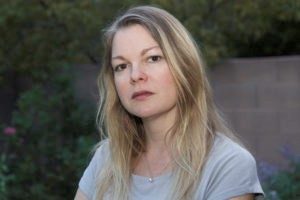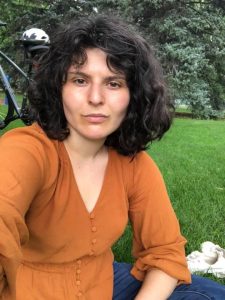 Michelle Ross is the author of the story collections There’s So Much They Haven’t Told You, winner of the 2016 Moon City Short Fiction Award, and Shapeshifting, winner of the 2020 Stillhouse Press Short Fiction Award (and forthcoming in 2021). Her fiction has appeared in Alaska Quarterly Review, Colorado Review, Electric Literature, Okay Donkey, The Pinch, and other venues. Her work is included in Best Microfictions 2020 and the Wigleaf Top 50 2019, among other anthologies. She is fiction editor of Atticus Review. She recently sat down with Lilia Shrayfer, editorial assistant at Colorado Review, to discuss her story “A Mouth Is a House for Teeth,” published in the Fall/Winter 2018 issue of the magazine.
Michelle Ross is the author of the story collections There’s So Much They Haven’t Told You, winner of the 2016 Moon City Short Fiction Award, and Shapeshifting, winner of the 2020 Stillhouse Press Short Fiction Award (and forthcoming in 2021). Her fiction has appeared in Alaska Quarterly Review, Colorado Review, Electric Literature, Okay Donkey, The Pinch, and other venues. Her work is included in Best Microfictions 2020 and the Wigleaf Top 50 2019, among other anthologies. She is fiction editor of Atticus Review. She recently sat down with Lilia Shrayfer, editorial assistant at Colorado Review, to discuss her story “A Mouth Is a House for Teeth,” published in the Fall/Winter 2018 issue of the magazine.
Lilia Shrayfer: One thought that I had when I read “A Mouth Is a House for Teeth” over the summer at the height of uncertainty and when isolation was new at the start of the pandemic—and as I reread the story yesterday—was that the world is experiencing something analogous to the isolation of motherhood.
Michelle Ross: Yeah, that’s a good point. To me, the story is so much about capturing that feeling of the isolation of new motherhood. When I was rereading it recently, I thought: Wow, this is similar to what everyone is dealing with right now. This feeling of being afraid of what’s outside the house, afraid of what’s inside the house, this feeling of being trapped and unable to go anywhere.
LS: You leave so much ambiguity, at least from my read, as to whether “protocol” is enforced only by this husband or it’s a societal protocol. I love that you leave it so open as to what the constraints are, or what the mechanics of those constraints are, because ultimately for the woman, it means the same for her.
MR: Right. I really like stories that are set in worlds that are largely familiar but that seem slightly strange. And I like it when stories don’t explain everything and don’t define everything. Because, like you said, it’s the feeling that matters most. We don’t really need to know the details of whether other mothers are in the same situation or not. What we need to know is that she’s isolated, she has nobody, except for this weird, distant husband whom she rarely speaks to on the phone and this child who’s with her. Her blog is basically her talking to nobody. And so that was important to me to not get wrapped up in trying to explain and, you know, think too hard about what this world is exactly. It definitely feels a little apocalyptic and yet at the same time, very familiar; it’s kind of hard to define.
LS: I totally hear you on the defamiliarization. What’s interesting is while reading your work I almost felt a refamiliarization—like I had forgotten the confines that were placed on my mother when I came into existence, new burdens and fears—so it felt like the story was defamiliarizing but also reacquainting me, which was a disorienting experience in a great way.
MR: I find that when I talk about making the familiar strange and making the strange familiar, those things blur in my mind. Because the familiar is already strange. And the strange is mostly already familiar. I’m not even sure which is which; they just kind of conflate.
LS: Yeah, it’s so interesting because the panic of parenting that you reveal so wonderfully feels so real. Nothing in the story feels outrageous, not even the supply boxes.
I don’t know if you have this feeling, but I find it so difficult to say what a story is about. When somebody asks me, I almost want to reply that it’s not about what it’s about . . . You’re nodding your head, so . . .
MR: I completely agree. I’m not going to get the quote right, but I know Flannery O’Connor talks about this. She says something like, “If you can summarize a story, then it’s a shitty story.” A story is a strange thing. It shouldn’t be explained, it shouldn’t be summarized. And every time I’m ever asked to do something like that, I find it excruciatingly painful. It can feel a bit arbitrary. I could describe the exact same story in so many different ways.
LS: Right. And there are so many conventions in storytelling—or we think there are. We think we have to know setting, when it is. Even the setting in your story is somewhat irrelevant. All we’re really given about the outside world is that a grocery store is two miles away. Do you find that you often break rules in narrative as a conscious part of your art-making or do you think it’s something that just happens maybe because that’s who you are as a writer?
MR: So I just did a round of developmental edits for my new short story collection, Shapeshifting. In their comments on “A Mouth is a House for Teeth,” the editors said, “Can we know a little bit more about this world? Is it our world? Is it in the future?” I thought really hard about that, but I like the sort of undefinable quality of the setting in this story. If I think I’m supposed to write a certain scene or component but it’s just like pulling teeth because I’m not really that interested in it or it feels wrong, then I take it as a sign that the story doesn’t need it, and I need to find some other way of getting around that problem.
LS: Have you always had a trust in your artist-self or has it evolved to become that over time in your career?
MR: Definitely it hasn’t always been there! And it’s not always there now. The more I write, I do think it becomes easier. I trust myself more. But at the same time, I certainly have days and moments when I don’t trust myself so much. But I always find that the answer in those situations is to put the story aside, to let it sit for a while then come back to it. Some stories I put aside for years. It can take a long, long time to be able to come back to them and see them more clearly and know what they actually need.
LS: I guess I’m being selfish because I’m in the middle of a revising project, but I’m interested always in what writers’ relationships are to revising.
MR: I love revision. I love tweaking sentences. I love moving the parts of a story around. It’s my favorite phase of the writing process. I find writing first drafts really hard. My biggest problem as a writer is that I’ll start something and rather than sweep through a draft really quickly before I lose momentum, I’ll start revising it before I’ve gotten very far into the story. This approach can kill stories before they really get going.
I always have several different projects going on at once. There’s never been a time where I’m working on a single story. Thus, there’s always something I could be revising. After putting a story aside for weeks or months or years, when I come back to it, I find that I’m no longer attached to that great paragraph I spent hours polishing. I’m no longer attached to order and shape, either. I find that problems that seemed really difficult to solve suddenly seem easy to fix. I think: Why was this so hard? Why was this something I was stressing over for months? Something clicks into place when I see it again.
LS: I love the way you put that. Just rearrange some things and rearrange yourself and see what happens. Are you generating anything new right now? Is your book in final stages?
MR: Yeah, so this new story collection Shapeshifting is tentatively scheduled to be published in November of 2021. It has 14 stories in it. It’s down to the copyediting phase now.
LS: What’s it about? Just kidding . . .
MR: Well, I will tell you that all of the stories relate to motherhood in various kinds of ways. I’m also shopping around a flash fiction collection, as well as a collaborative short story collection I wrote with my good friend and writing partner, Kim Magowan
LS: Are you reading or watching anything that’s inspiring you or filling you up in some way?
MR: I’ve been re-watching The Office with my ten-year-old, and I’ve been thinking so much about how fantastic the characters are. They’re all so complex. I mean Michael Scott is such a jerk and then, at the same time, he’s sensitive and surprising. Recently, I’ve been rereading Karen E. Bender’s great story collection, Refund. I’m also reading novels again. I hadn’t read novels hardly at all for years now because I just felt like I didn’t have time for that kind of reading. But I think something about this whole pandemic—not leaving the house hardly ever, having nowhere to go—has brought me back to novels. I just recently finished Rumaan Alam’s Leave the World Behind and Lydia Millet’s A Children’s Bible. Both were great and, also, unsettling. Their apocalyptic worlds feel too familiar. Now I’m reading Sahar Mustafah’s The Beauty of Your Face, as well as reading a lot of nonfiction. I find that anything I read that I enjoy or admire inspires my own writing in one way or another.
 Lilia Shrayfer is a first year fiction writing MFA candidate and graduate teaching assistant at Colorado State University. Before coming to grad school, Lilia worked at Lambda Literary and as a paralegal. She’s also a playwright and alumna of Brandeis University, Sackett St. Writers’ Workshop, and the National Theatre Institute. In New York, Lilia performed as an actor at 13th St Rep, Dixon Place, Playwrights Horizons’ New York Musical Festival, and Columbia University. Lilia is happy around dogs and books.
Lilia Shrayfer is a first year fiction writing MFA candidate and graduate teaching assistant at Colorado State University. Before coming to grad school, Lilia worked at Lambda Literary and as a paralegal. She’s also a playwright and alumna of Brandeis University, Sackett St. Writers’ Workshop, and the National Theatre Institute. In New York, Lilia performed as an actor at 13th St Rep, Dixon Place, Playwrights Horizons’ New York Musical Festival, and Columbia University. Lilia is happy around dogs and books.